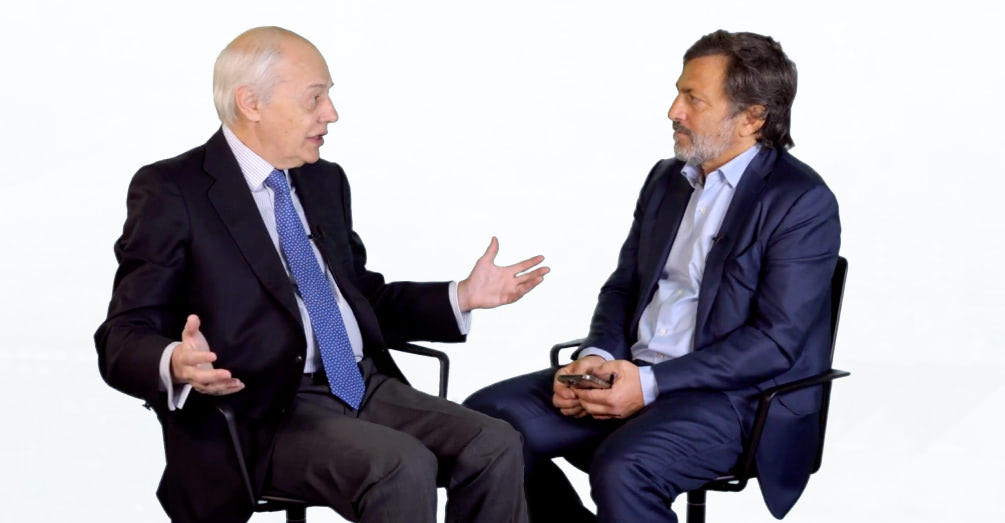Compliance Matters #7 | Joaquín Garralda Professor at IE University, member of the Executive Committee of the Spanish Global Compact Network and President of Spainsif | IE University & Elecnor Podcast

In this seventh episode, we talk with Joaquín Garralda, Professor at IE University, member of the Executive Committee of the Spanish Global Compact Network and President of Spainsif, to discuss sustainability, ethics and compliance in the business sector.
Our Host Enrique Aznar, academic director of the IE-Elecnor Observatory on Sustainable Compliance Cultures discusses with Joaquín Garralda how it is possible to make compliance and sustainability go hand in hand in organizations, especially within an ethical corporate culture. In addition, they also reflect on how the figure of the investor adds, in addition to the legislation in force in each country, to the fight against corruption.
As Joaquín Garralda begins by explaining, in the Spanish context many companies began to integrate this concept of sustainability into their strategy thanks to the regulation with compliance, which involved the establishment of values, a code of ethics and control and supervision systems that guarantee a whistle-blowing channel.
All these factors are articulated as pieces that must be incorporated into the corporate culture and the code of conduct from the internal debate of the organization itself, because, as Enrique Aznar and Joaquín Garralda reflect, in addition to complying with some essential principles required by law, we must subsequently work on them, and give even more muscle to these values through practice and good practice.
In addition, Joaquín Garralda offers us a key piece of advice so to make the company’s strategy credible: to set medium- and short-term objectives. He exemplifies this with a sustainable objective that is the order of the day in the sector to reduce CO2 emissions from business activity, known as “horizon 2050, net-zero”. Regarding this, Joaquín Garralda recommends creating a closer narrative, replacing this 2050 target with what we really can and want to achieve in, for example, 2030. In fact, according to his own experience representing IE at Spainsif (a forum for debate on sustainable investment), he has seen that investors and financial institutions place even more trust in companies with a credible narrative, close to reality and current affairs, as well as with an ethical, sustainable and compliance corporate culture.
Enrique Aznar comments, in turn, on Joaquín Garralda’s role in the Global Compact, representing IE, where various companies contribute solutions together with the United Nations to global problems, especially with respect to those countries with weak legislation. In Spain, Joaquín Garralda explains, one of the major efforts has focused on helping and training SMEs to communicate correctly and transparently what they are doing, especially what they are doing well, since, despite not having so many resources, more and more SMEs in certain sectors are realizing the importance of incorporating sustainability into their strategy for business competitiveness.
With all this, the protagonists of this podcast come to the consensus that “training” is the key to acquiring an increasingly ethical corporate culture and, therefore, attracting talent to the organization, as toxic corporate cultures are the main factor why jobs are abandoned.
Finally, Enrique Aznar invites us to conclude this episode by reflecting on the different corporate cultures in some countries and the sensitivity of both companies and employees to the fight against corruption in ethics and sustainability. Joaquín Garralda, as an international researcher, concludes that one of the biggest problems in the international framework is that problems such as corruption have been culturally accepted in some countries. However, he explains that what is helping in the fight against corporate corruption, in addition to the legislation in force in each country, is a very important figure: the investor. Years ago, investors only looked at profitability and risk, but nowadays they take into account ESG (Environmental, Social and Governance) factors when making investment decisions.
In this way, Joaquín Garralda argues that regulation, society in general and investors are the figures that will push companies to eradicate corruption and start making decisions through ethics, good governance and sustainability. For, as Joaquín Garralda concludes in this seventh episode, business and ethics must go hand in hand: “Indeed, you have to do business, but there is something that is worth a lot, above all else, which is a reputation of trust and a reputation based on ethical behavior,” says Joaquín Garralda.
*Compliance Matters: We care about sustainable future.*
Puedes ver la entrevista en YouTube o escucharnos a través de:
Spotify | Anchor | Ivoox | Google Podcast



